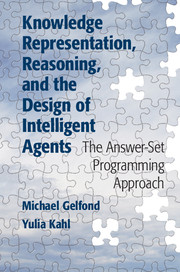 Knowledge Representation, Reasoning, and the Design of Intelligent Agents
Knowledge Representation, Reasoning, and the Design of Intelligent Agents Book contents
- Frontmatter
- Dedication
- Contents
- Preface
- 1 Logic-Based Approach to Agent Design
- 2 Answer Set Prolog (ASP)
- 3 Roots of Answer Set Prolog
- 4 Creating a Knowledge Base
- 5 Representing Defaults
- 6 The Answer-Set Programming Paradigm
- 7 Algorithms for Computing Answer Sets
- 8 Modeling Dynamic Domains
- 9 Planning Agents
- 10 Diagnostic Agents
- 11 Probabilistic Reasoning
- 12 The Prolog Programming Language
- Appendix A ASP Solver Quick-Start
- Appendix B Aspide
- Appendix C Introduction to SPARC
- Appendix D Code
- Bibliography
- Index
5 - Representing Defaults
Published online by Cambridge University Press: 05 July 2014
- Frontmatter
- Dedication
- Contents
- Preface
- 1 Logic-Based Approach to Agent Design
- 2 Answer Set Prolog (ASP)
- 3 Roots of Answer Set Prolog
- 4 Creating a Knowledge Base
- 5 Representing Defaults
- 6 The Answer-Set Programming Paradigm
- 7 Algorithms for Computing Answer Sets
- 8 Modeling Dynamic Domains
- 9 Planning Agents
- 10 Diagnostic Agents
- 11 Probabilistic Reasoning
- 12 The Prolog Programming Language
- Appendix A ASP Solver Quick-Start
- Appendix B Aspide
- Appendix C Introduction to SPARC
- Appendix D Code
- Bibliography
- Index
Summary
The closed world assumption introduced in the previous chapter is an example of a default — a statement of natural language containing words such as “normally” “typically” or “as a rule” Defaults are very useful to humans because, in the absence of complete information, they allow us to draw conclusions based on knowledge of what is common or typical. However, these conclusions are tentative, and we may be forced to withdraw them when new information becomes available. In fact, a large part of our education seems to consist of learning various defaults, their exceptions, and the skill of reasoning with them. Defaults do not occur in the language of mathematics and, therefore, were not studied by classical mathematical logic. However, they play a very important role in everyday commonsense reasoning and present a considerable challenge to AI researchers. In this chapter we show how defaults and various forms of exceptions to them are represented in ASP and how this general representation can be used for reasoning in a variety of simple domains. After that, we show how defaults can be used to reason about knowledge bases with incomplete information, which is represented by so-called null values. Next, we demonstrate how defaults can be prioritized so that, in some cases, one default is preferred over another. Finally, we discuss the use of defaults when representing hierarchies of classes and the inheritance of class properties by subclasses and members.
- Type
- Chapter
- Information
- Knowledge Representation, Reasoning, and the Design of Intelligent AgentsThe Answer-Set Programming Approach, pp. 86 - 113Publisher: Cambridge University PressPrint publication year: 2014


